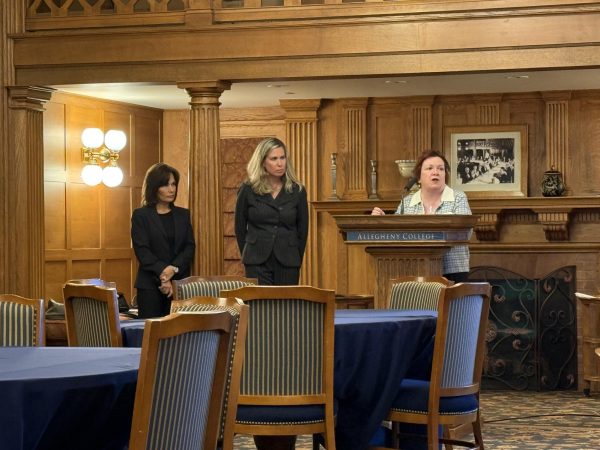Young returns to campus to discuss business law and ethics
Partner at Willkie Farr and Gallagher LLP and Allegheny trustee Michael Young, ’78, made his way back to campus to discuss business law and ethics.
The Bruce R. Thompson Center for Business and Economics in partnership with the Law and Policy Program invited Young to its Lunchtime Learning Speaker Series on Thursday, Oct. 17 to present his talk, “What Were They Thinking? How Honest People Go Bad … A Little at a Time,” at 12:15 p.m. in Quigley Auditorium.
“I am delighted to be back here at Allegheny,” Young said. “I graduated in the class of 1978. I was an English major, so I am uniquely qualified to speak to the issues of ‘What were they thinking … How is it that good people go bad.”
Following his graduation from Allegheny, Young attended Duke University School of Law, where he was Research and Managing Editor of the Duke Law Journal.
“(Young) decided to seek his fortune in New York City, where he obtained a summer internship at Willkie Farr and Gallagher,” Carlos Sanchez, ’20, who introduced Young at the series.
Currently, Young serves as a litigation partner at New York’s Willkie Farr and Gallagher LLP, where he is the chair of the firm’s litigation and security practice. Young was named one of the “top 100 most influential people in accounting,” by “Accounting Today” magazine.
Young’s work focuses on representing companies, audit committees, officers, directors, accounting firms and investment banks in the United States and international securities class actions, U.S. Securities and Exchange Commission’s proceedings and special committee investigations.
In addition, Young has previously served as a member of the Financial Accounting Standards Board’s Financial Accounting Standards Advisory Council, chair of the New York City Bar Association’s Financial Reporting Committee and as counsel to the American Institute of Certified Public Accountants and the Center for Audit Quality.
Young has also authored and edited a number of books focusing on financial reporting, audit committee effectiveness and the role of independent auditors, including “The Financial Reporting Handbook,” “Accounting Irregularities and Financial Fraud” and “Financial Fraud Prevention and Detection: Governance and Effective Practices.”
Young began his presentation by explaining that no one is exempt from getting into trouble with the law.
“I have watched people who I would view as every bit as honest, decent and honorable as anybody in this room get five to 15 years (in prison), while all the while, they thought they were continuing to be honest, decent and honorable,” Young said.
Young explained that people get in trouble with the law not because of dishonesty, lack of ethics or lack of integrity, but instead the pressure for results.
“The private sector expects results,” Young said. “No truer words have ever been spoken.”
These pressures can come from many different aspects of a company, including sales goals, loan covers and bonus objectives, according to Young.
“Let me give you a piece of legal advice,” Young said. “Ignorance of the law is no excuse.”
The U.S. Securities and Exchange Commission goes after CEOs, newly hired lower level employees and everyone in between, according to Young, who explained that he has watched people just out of school be investigated.
“The most difficult thing is to recognize if people are talking about doing something wrong,” Young said.
Young presented the audience with two words he suggested everyone write down and remember for the rest of their careers.
“The first word is transparency,” Young said. “The second word is objectivity. If you are ever in a meeting where the company cannot be transparent, or if you are ever in a meeting where the company cannot be objective, you are in the danger zone.”
Young defined transparency as telling things like they are, including the good, the bad and the dirty, and objectivity as not letting reports of bad news be influenced by the audience.
“If it is the truth, it needs to be said,” Young said. “The alternative is much, much worse.”
Young explained that as difficult as it may be, if students find themselves in situations where they are working for a company that cannot be transparent and objective, they will need to voice their concerns.
“It takes courage to (voice concerns) and it might blow up in your face,” Young said. “It is a judgment call you will have to make.”
Transparency and objectivity are critical for both junior associates and CEOs, according to Young.
“I don’t want anyone to leave this discussion with the impression that it is a sea of corruption out there,” Young said. “If you keep in mind those two concepts, transparency and objectivity, I have every confidence that I will never find myself alone in a conference room with a sobbing CEO from Allegheny College.”
Hannah Schaffer is a junior majoring in community and justice studies and minoring in economics and journalism in the public interest. This is Schaffer’s...





